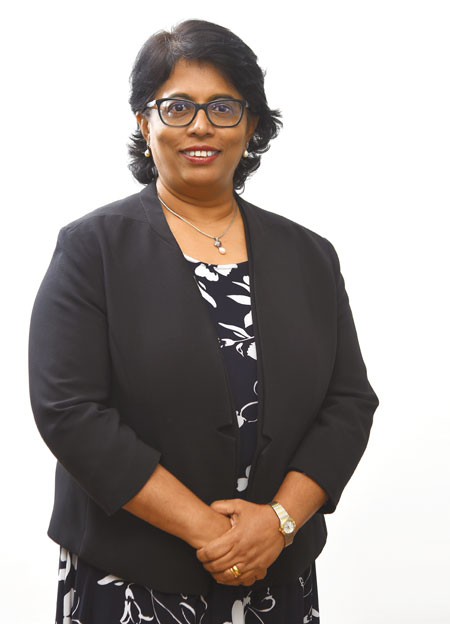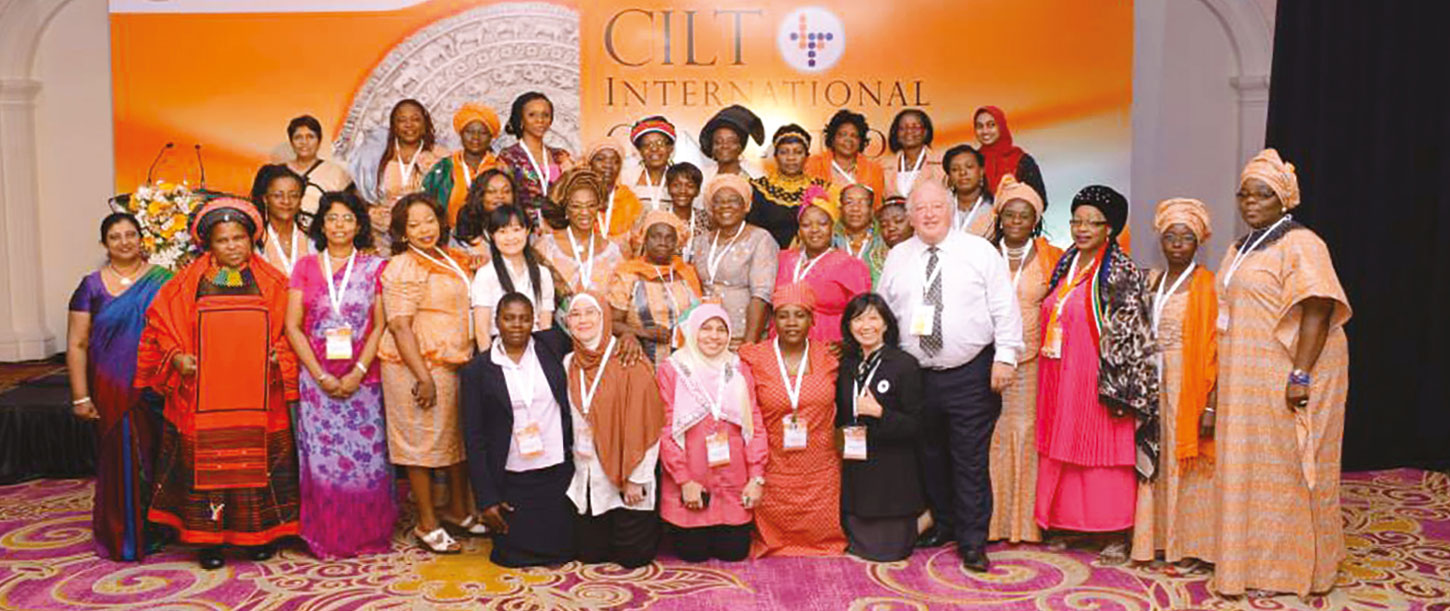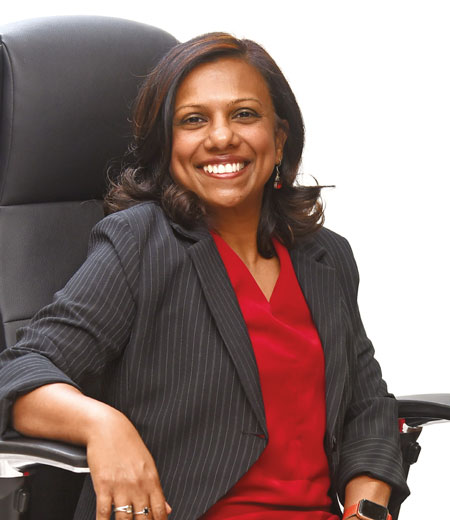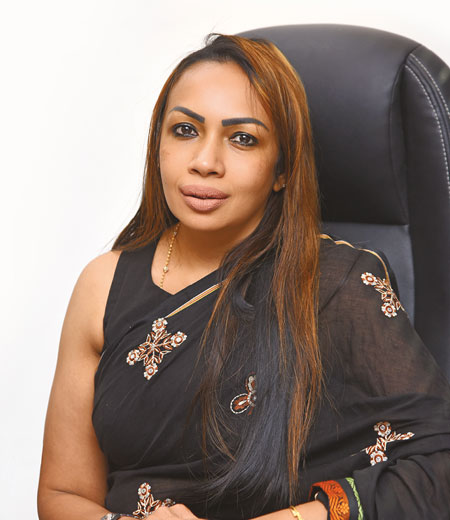PROMOTING DIVERSITY
WiLAT Global
Q: You pioneered female entry into the field of logistics and transport, and are the Global Chairperson of Women in Logistics and Transport (WiLAT). However, this sector in our country remains male dominated. Why do women shy away from it? And what steps has your organisation taken to empower women in the field?
A: My entry into the field of logistics and transport was purely accidental. I am engineering educated and now, a supply chain professional. After my postgraduate studies, I joined Unilever Sri Lanka in 1995 as a management trainee and ended up in the supply chain area quite by accident.
When I was appointed to the board in 2008, I was the first female Supply Chain Director of Unilever in South Asia. In 2011, I joined The Chartered Institute of Logistics and Transport (CILT) to broaden my external orientation, recognising CILT as the global professional body in my field of work.
Recognising there were very few females in the field, CILT realised the need to get more women into the sector. This led to the formation of a Women’s Forum in the Chartered Institute of Logistics and Transport. I became the cofounder of Women in Logistics and Transport (WiLAT) when we launched it in Sri Lanka on 21 March 2013.
Women faced many drawbacks in entering our sector. First, there was misinformation about this field. Social norms played a major role in hampering women entering. Women were portrayed as too feminine and incapable of enduring long working hours.
The sector was also seen as female unfriendly – a macho environment. Archaic labour laws hampered women’s participation. Some private sector organisations still hesitate to recruit women, fearing added costs due to maternity leave benefits and so on.
To counter this, WiLAT initiated the ‘Ignite’ mentoring programme for women, and several career guidance and exposure programmes promoting the sector as being essential to everyday needs.
When WiLAT was launched in 2013, we had less than 10 per cent women in our CILT membership. Today, the figure has risen to 24 per cent as a result of these efforts.
Q: What is your definition of a gender diverse workplace?
A: In my opinion, a gender diverse workplace is where everybody has an equitable opportunity to contribute to the organisational agenda.
If there is equity among workers, this means that it’s a gender diverse workplace – a place where gender bias does not play any role in preventing anyone joining the world of work. I strongly believe that one’s gender should not define what one wants to do in life.
Q: Are there any unconscious biases in the way local organisational processes are set up?
A: Starting at the pre-interview stage, many advertisements refer to long working hours, fieldwork, outstation travel, overnight stays and so on, which obstruct women’s entry. In multinational organisations, these concerns are off-limits.
There is a need for female-friendly policies regarding gender safety at the workplace, ‘flexi’ hours, career breaks and upskilling workers when they return to work.
It is important to have conscious and unconscious bias training in businesses for interviewers to know what one should not ask.
Q: What are the benefits of supporting gender diverse workplaces?
A: Research has shown that genders have different skill sets. Men are regarded as high in IQ. Women are considered high in emotional (EQ) and moral (MQ) quotients. In the context of what we are enduring today, you need to manage emotions and develop effective relationships with customers to stay ahead of the game.
In an assessment of Fortune 500 companies, it has been clearly shown that businesses where there are women on their boards have improved environmental, social and governance (ESG) performance, earnings per share (EPS), return on equity (ROE) and so on.
A recent McKinsey Global Institute research revealed that US$12 trillion can be added to global growth by advancing gender equality. Sri Lanka has the potential to add 20 billion US Dollars a year to its GDP by 2025, which could boost its current economic trajectory.
Women are driving our economy – Middle Eastern remittances, the plantation sector and apparel industry are driven by them. However, these women are at the bottom of the job pyramid.
We need to upskill them, ensure decent work and provide dignity of labour so they can contribute as dignified workers in an inclusive industry setting.
Gayani de Alwis FCILT
Global Chairperson
“There is a need for female-friendly policies regarding gender safety at the workplace, ‘flexi’ hours, career breaks and upskilling workers when they return
Email gdealwis@ymail.com
Website ciltinternational.org
WiLAT
10TH ANNIVERSARY
Women in Logistics and Transport (WiLAT) is the women’s forum of the Chartered Institute of Logistics and Transport (CILT). The parent organisation, CILT is the leading international professional body for everyone who works in the supply chain, logistics and transport sectors.
Established in 1919 and receiving its Royal Charter in 1926, the institute’s Patron is the Princess Royal. The Chartered Institute of Logistics and Transport is an established global professional body. With more than 33,000 members working in over 100 countries worldwide, CILT enjoys unparalleled professional recognition internationally.
The principal objective of the Institute is: “To promote and encourage the art and science of logistics and transport.” And CILT achieves these objectives through both its membership and their educational qualifications.
WiLAT has been a driving force in CILT; and now, it has 38 chapters globally with a membership of more than 3,300 professionals. WiLAT Sri Lanka was founded in 2013, at the CILT international convention held in the island that year.
The Founding Co-Chairs of WiLAT Sri Lanka were Gayani de Alwis FCILT and Namalie Siyambalapitiya FCILT. Over the last 10 years, WiLAT Sri Lanka has been growing steadily under the leadership of its past chairpersons. They are:
Chairperson (2013-2017) – Gayani de Alwis FCILT
Chairperson (2017-2019) – Dhashma Karunaratne CMILT
Chairperson (2019-2021) – Gayathri Karunanayake CMILT
Current Chairperson (2021-2023) – Niroza Gazzali CMILT
Amra Zareer CMILT, Prof. Renuka Herath CMILT and Dilmini Weragama CMILT are the current Vice Chairpersons of WiLAT Sri Lanka for Membership Development, Membership Services and Branding & Sponsorships respectively. Dr. Priyangani Jayasundara CMILT and Vijitha Weerasinghe CMILT are respectively the current honorary Secretary and Treasurer of WiLAT Sri Lanka.

The mission of WiLAT is to promote the status of women in the supply chain, logistics and transport sectors; bring together those who aid the career development of these professionals; and provide a support network for their colleagues in the sector.
Its work towards this goal is focused on several key strategic thrusts: leadership, mentorship, entrepreneurship, empowerment and sustainability.
Over the last 10 years, WiLAT Sri Lanka has been an active contributor to the logistics sector in the governmental, corporate and academic spheres. It has organised mentoring programmes, women’s empowerment initiatives, CSR projects, tree planting campaigns, conferences, forums, knowledge sharing sessions, webinars, walks, membership drives and career guidance workshops.
Its signature event, which is celebrated every year, remains its mentoring programme under the name ‘Ignite.’ It has groomed and mentored around 200 undergraduates, and produced six successful batches, all of which have reaped the benefits of this programme.
The mentoring programme is globally accepted and adopted in other WiLAT countries. In 2017, WiLAT Sri Lanka won an award of recognition for Ignite in the poster campaign at the President’s Dinner at CILT’s international convention held in Macao.
WiLAT Sri Lanka has gone over and above with its contribution to the logistics sector – not only locally but also, globally. Its members hold global positions at WiLAT Global and have been driving the WiLAT agenda successfully.
Some of the global positions currently held by WiLAT Sri Lanka members are:
WiLAT Global Chairperson – Gayani de Alwis FCILT
WiLAT Global Vice Chairperson (South Asia) – Gayathri Karunanayake CMILT
WiLAT Global Media Coordinator – Amra Zareer CMILT
WiLAT Global Newsletter Editor – Indeewari Chandrasekara MILT
As it marks its 10th anniversary, WiLAT pledges to stay true to its mission to promote the status of women in logistics and transport; and bring together those who support the talent and career development of these professionals by providing a support network, and mentoring opportunities, for female colleagues in the sector.
WiLAT Sri Lanka will continue to drive WiLAT’s vision forward to be the most sought after professional body for advocacy, professionalism and empowerment of women in the logistics, transport and supply chain sectors.
Email wilat@ciltsl.com
Website www.wilat.org
EFL Global
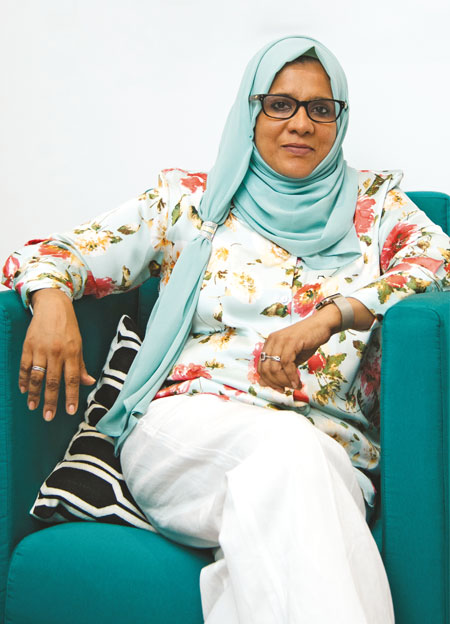
Chief Process Officer
Q: How relevant is gender in the workplace?
A: In an ideal world, a level playing field should exist. It should be one where everyone has equal opportunities and is judged on skills, abilities and merits – regardless of gender. It’s high time we introduce ‘blind recruitment’ where an applicant’s personal information such as name, age and gender are removed from resumes.
Organisations should have systems and processes to measure performance, and how efficiently and promptly assignments are delivered – not who is delivering it. There should be customised programmes to support employees, regardless of gender. But the reality is that gender biases exist and create barriers for individuals.
Ignoring the issue will not solve the problem. A level playing field should ideally be one in which gender does not play a role in decision making.
Q: What is your definition of a gender diverse workplace? And what is the situation in Lanka?
A: A gender diverse workplace is one where diversity of opinion and insight is truly valued.
Governments around the world are recognising that they cannot continue to develop and prosper without fully engaging half of their population. The last decade has witnessed a great deal of change and much was achieved in Sri Lanka to promote equality for women.
Q: Are there any unconscious biases in the way local organisational processes are set up? How can the corporate world move beyond these limitations, if so?
A: There are unconscious biases in people. As human beings, we gravitate towards those whom we can relate to – people from the same sex or race.
In my experience, organisational processes are not biased towards any single category of people. All organisations look to maximise efficiency and productivity.
Q: Regarding aspects such as pay equity – how is Sri Lanka, faring compared to the region? What areas should we look to improve?
A: I am not aware of the country’s overall situation. On the other hand, equity in terms of pay is more complex when taking Sri Lanka into account. It should start with the dignity of labour. Many jobs aren’t respected in our society because they’re seen as menial jobs.
Despite their respective workloads, people fail to understand that every cog is important in ensuring the economic engine stays functional. We certainly can do better in terms of pay equity by first changing minimum wages into liveable remuneration.
That may raise costs but it makes sense that every individual should be able to live a reasonable life.
The amount of work you put in within a given period of time is what matters – not the number of hours. Efficiency and productivity are what matters in the modern corporate landscape.
Q: What benefits can corporates enjoy by promoting and supporting gender diverse workplaces?
A: The diverse workforce at EFL Global has increased our organisational effectiveness. Every day, we find it to be lifting morale and enhancing productivity.
The benefits go beyond financial measures. They encompass learning, creativity, flexibility, organisational and individual growth, and the ability to adjust rapidly and successfully to market changes. These are some of the benefits we have noticed.
A diverse workforce brings different perspectives of how to reach goals, frame tasks, create effective teams, communicate ideas and lead.
Q: What are the most pressing issues to mitigate as regards gender diversity in your sector?
A: Logistics has traditionally been a male dominated sector. But in recent times, it has diversified and embraced transformation. Global research reveals that female leaders are switching jobs at higher rates – not only in our industry but across the board. They leave for organisations with better career opportunities, flexibility, and a real commitment to diversity, equity and inclusion (DEI).
Diversity goes beyond increasing the headcount numbers of a specific group. It should be understood as the varied perspectives and approaches to work, which members of different identity groups bring with them. Employees and leadership must recognise the learning opportunities and challenges, which the expression of different perspectives presents.
“Organisations should have systems and processes to measure performance, and how efficiently and promptly assignments are delivered – not who is delivering it
Telephone 4766300
Website efl.global
Logicare
In March, the world celebrates women and their achievements. In many instances, their performances have gone largely unnoticed.
Gayathri Karunanayake – Global Vice Chairperson of Women in Logistics and Transport – South Asia and Head of Operational Excellence; Sharmali Perera – Director; Dr. Mihirini de Zoysa, Principal Coach and Managing Director – Corporate Druids; and Rochelle Mortier, Chief HR Officer – Logicare are women who have worked their way up the corporate ladder against all odds faced by women.
They have also broken into the male dominated transport and logistics industry.
LMD sought these women’s insights into and experiences in their fields of work, as well as gender diversity and inclusiveness, and the reasons why more women are not venturing into the workforce.
All of them emphasised gender diversity, which is a goal all women aspire to. A gender diverse workplace is one where men and women are treated fairly – with equal pay, benefits, opportunities and promotions. Excellence is not the prerogative of a particular gender. Rather, it identifies skills and good management – a point emphasised in different ways by all these four.
De Zoysa notes that despite key forex earners such as tea, apparel and migrant employment being female dominated, women still earn less than men for the same job. A UN women’s study in 2020 shows they earn only 76 cents to every dollar earned by men, she reveals.
Referring to the large gap between males and females in the workforce, Perera points out that in 2019, the female labour force participation rate in the world was only 47 per cent. With the challenges raised by the COVID-19 pandemic, the gender gap is estimated to have widened further.
A study by UN ESCAP in 2019 reveals female representation in Sri Lanka’s transport and logistics sector was around 3.4 per cent compared to 96.6 per cent male representation, Perera observes. This reflects a serious gender gap despite many attempts by authorities and sector personnel to bridge the gap.
Diversity goes beyond increasing the headcount of a specific group. It should be understood as the varied perspectives and approaches to work, which members of different identity groups bring. All employees and those in leadership must recognise both the learning opportunities and challenges that such an expression of diverse perspectives presents.
In the logistics sector, the unconscious promotion of males is common due to structural setups. Also, social norms discriminate against women’s participation in the sector irrespective of their skill sets, Karunanayake points out.
She asserts that corporates need to accept we all have unconscious biases. Therefore, anti-bias training programmes for decision makers could help bring greater diversity to the sector. Further, organisations need to have a diversified interview board for recruitment, as well as wider organisational social circles and networks to screen talent.
Reimagining motherhood and supporting working mothers is essential for achieving greater gender equality, and creating an equitable and sustainable society. By providing better support for working mothers, we can help ensure that women are able to fully participate in the workforce, and achieve their full potential as parents and professionals.
Creating more flexible work arrangements, such as telecommuting and flexible hours, will help individuals to optimise their parental roles and careers.
Mortier affirms that women are as competent and equally capable of delivering proven results.
“At Logicare, we have women who are highly committed to their jobs; and we consciously encourage women to join our workplace to experience and explore the rewarding opportunities that are available in the logistics sector,” she asserts.
Corporate Sri Lanka has come a long way in terms of pushing through these barriers and made significant changes to uplift female employees by initiating various programmes while continuously promoting women in the workplace, Mortier notes.
De Zoysa agrees, adding that job roles are often defined with men in mind.
“Working environments are mostly suited to men. Organisations see adapting working environments to the needs particular to females – such as their monthly cycle, pregnancy, giving birth and nursing babies – as concessions to be made, rather than rights,” she says, ruefully.
Telephone 4847777 | Email info@logicare.lk | Website www.logicare.lk


